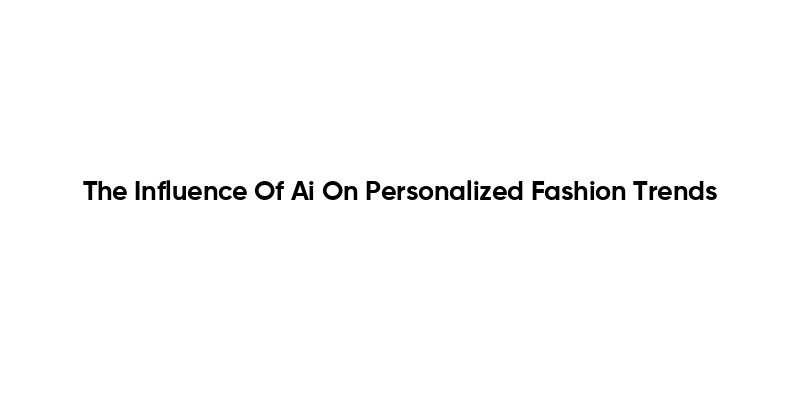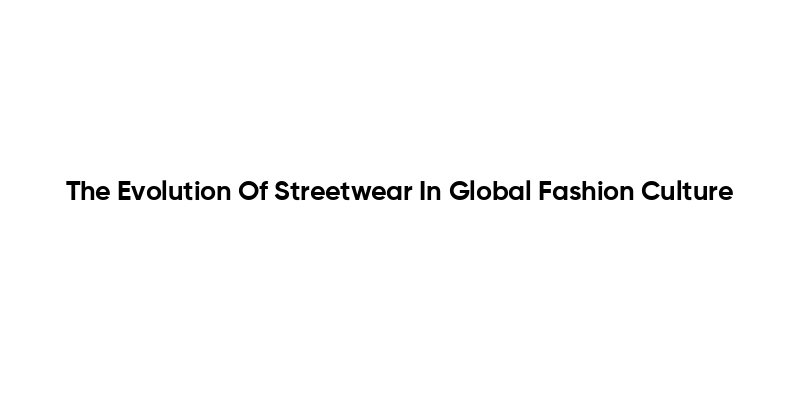In recent years, the influence of AI on personalized fashion trends has become increasingly significant, revolutionizing the way consumers interact with fashion brands. With advancements in machine learning and data analytics, AI technologies are now capable of analyzing consumer preferences, predicting trends, and even creating unique designs tailored to individual tastes. This transformation not only enhances the shopping experience but also empowers brands to deliver more relevant and engaging content to their audiences.
As we delve deeper into the influence of AI on personalized fashion trends, you will discover how algorithms are reshaping the fashion landscape by providing insights into consumer behavior and preferences. From virtual fitting rooms to AI-driven style recommendations, the integration of technology in fashion is creating a more personalized shopping experience. Furthermore, we will explore the ethical implications and challenges that arise as AI continues to evolve within the industry.
Stay with us as we uncover the fascinating ways AI is not only influencing current fashion trends but also paving the way for the future of personalized style. Whether you are a fashion enthusiast, a tech-savvy shopper, or simply curious about the intersection of technology and fashion, this article will provide you with valuable insights and inspire you to embrace the future of fashion innovation.
AI-Driven Style Recommendations
Artificial Intelligence has revolutionized the way consumers receive style recommendations. By analyzing user data, including past purchases, browsing history, and social media activity, AI algorithms can suggest outfits that align with individual preferences. This personalized approach not only enhances the shopping experience but also increases customer satisfaction and loyalty.
Moreover, AI-driven style recommendations can adapt in real-time, learning from user interactions to refine suggestions further. This dynamic capability allows fashion retailers to provide a tailored experience that resonates with each customer, ultimately driving sales and fostering brand loyalty.
Virtual Fitting Rooms and Augmented Reality
Virtual fitting rooms powered by AI and augmented reality (AR) technology are transforming the way consumers try on clothes. These innovative solutions allow shoppers to visualize how garments will look on them without physically trying them on. By using their smartphone cameras or AR mirrors, customers can see a realistic representation of themselves in various outfits.
This technology not only enhances the shopping experience but also reduces return rates, as customers can make more informed decisions. As a result, retailers benefit from increased efficiency and reduced costs associated with returns, while consumers enjoy a more engaging and personalized shopping journey.
Predictive Analytics in Fashion Trends
Predictive analytics is another area where AI significantly impacts personalized fashion trends. By analyzing vast amounts of data, including social media trends, search queries, and sales patterns, AI can forecast upcoming fashion trends. This insight allows brands to stay ahead of the curve and tailor their collections to meet consumer demand.
Furthermore, predictive analytics can help retailers optimize inventory management, ensuring that popular items are readily available while minimizing overstock. This strategic approach not only enhances profitability but also aligns product offerings with consumer preferences, creating a more personalized shopping experience.
Customization and Made-to-Order Fashion
AI is enabling a new era of customization in fashion, allowing consumers to create made-to-order garments that reflect their unique style. Through AI-driven design tools, customers can select fabrics, colors, and styles to create personalized pieces that cater to their individual tastes.
This shift towards customization not only empowers consumers but also promotes sustainability by reducing waste associated with mass production. As more brands embrace this model, the fashion industry is moving towards a more personalized and environmentally conscious future.
The Role of Social Media in AI-Enhanced Fashion Personalization
Social media platforms play a crucial role in the intersection of AI and personalized fashion trends. By leveraging AI algorithms, brands can analyze user-generated content to identify emerging trends and consumer preferences. This data-driven approach allows fashion retailers to create targeted marketing campaigns that resonate with their audience.
Additionally, social media influencers and user-generated content can significantly impact fashion choices. AI tools can help brands identify key influencers and track their impact on consumer behavior, enabling more effective collaborations and marketing strategies. This synergy between AI and social media is reshaping the fashion landscape, making it more personalized and engaging for consumers.
| Aspect | Description |
|---|---|
| Introduction | Artificial Intelligence (AI) is transforming the fashion industry by enabling personalized experiences for consumers, enhancing design processes, and predicting trends. |
| Personalization | AI algorithms analyze consumer data, including preferences and purchase history, to offer tailored recommendations, creating a unique shopping experience. |
| Trend Prediction | AI tools utilize data analytics to forecast fashion trends by analyzing social media, search patterns, and consumer behavior, allowing brands to stay ahead of the curve. |
| Design Assistance | AI aids designers by generating new ideas and patterns based on existing styles, streamlining the creative process and reducing time to market. |
| Sustainability | AI contributes to sustainable fashion by optimizing supply chains, reducing waste, and promoting eco-friendly materials through data-driven insights. |
| Consumer Engagement | Brands leverage AI to enhance customer engagement through chatbots and virtual stylists, providing instant support and personalized styling advice. |
| Conclusion | The integration of AI in fashion not only personalizes the shopping experience but also drives innovation, sustainability, and efficiency in the industry. |



